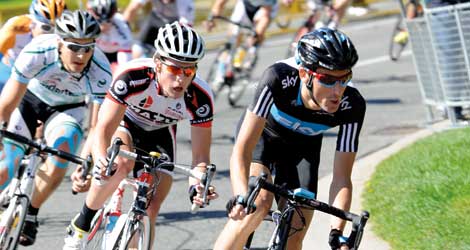Michael Barry on Drugs in the Peloton


On Monday, former pro cyclist Michael Barry was in the news once again because of drugs in the peloton. This time it wasn’t the familiar culprits, such as EPO or HGH. The retired Canadian rider spoke to the Times about substances that lie within a bit of a grey zone: painkillers.
“I used tramadol at Sky,” Barry said of an opioid-based painkiller in use during his tenure (2010 to 2012) at the British cycling team. He went on to say that the drug alleviated the pain in his legs and allowed him to race hard. Other effects were a feeling of euphoria and trouble concentrating. Barry, who spoke to the British media outlet ahead of the release of his new book, Shadows on the Road, has indicted that painkillers, stimulants and sleeping pills, to manage the effects of the former, are still in the mix in pro cycling.
In October 2012, the U.S. Anti-Doping Agency (USADA) released testimony by Barry and other cyclists who rode on Lance Armstrong’s U.S. Postal team. The affidavits contained details of widespread doping on the U.S. pro team. Barry was handed a six-month ban and was stripped of results from May 2003 and July 2006. In his testimony, he said he had stopped doping in 2006. Drug use, however, continued.
Later on Monday, Sky Pro Cycling issued a statement saying that for the past two seasons, its riders didn’t use tramadol in training or racing. It went on to call for the World Anti-Doping Agency to add the painkiller to its prohibited list.
Recently, Lotto-Belisol team doctor Jan Mathieu went on record saying the crashes in the early spring races this year can be linked to tramadol use by some riders. In 2012, while pro cycling was in the midst of the fallout from the USADA report, U.S. rider Taylor Phinney spoke out against the pill culture that was still part of cycling.
I love to see @StevoCummings win. He, like me, follows his own personal policy of no caffeine pills and no painkillers. Purest of the pure!
— Taylor Phinney (@taylorphinney) October 13, 2012
“You see so many late-race stupid crashes that I almost wouldn’t be surprised if some or most of those crashes are caused by people taking these hard-hitting painkillers at the end of races,” Phinney told VeloNation. “There is widespread use of finish bottles, which are just bottles of crushed up caffeine pills and painkillers. That stuff can make you pretty loopy, and that is why I have never tried it. I don’t even want to try it as I feel it’s dangerous.”
